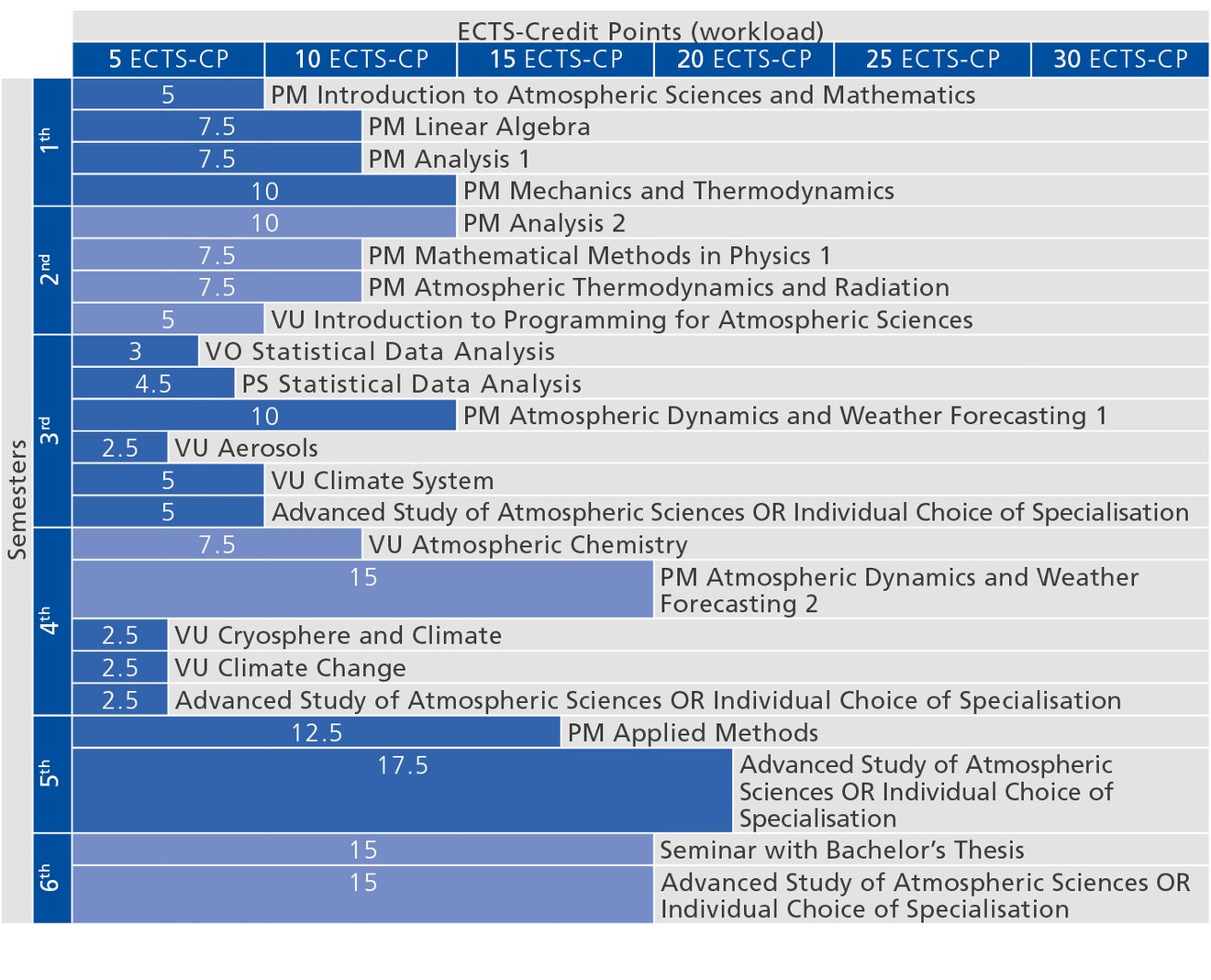Bachelorstudium Atmospheric Sciences
Curriculum (2021W)
From the winter semester 2025/2026, admission to this programme may only be granted in accordance with the new curriculum.
Bachelor of Science
Duration/ECTS-Credits
6 semesters/180 ECTS-Credits
Mode of Study
Full-time
Language
German
Requirements
Secondary school completion certificate or equivalent and Language Certificates
Faculty
Faculty of Geo- and Atmospheric Sciences
Qualification Level
Bachelor (First Cycle)
ISCED-11: Level 6, EQR/NQR: Level 6
ISCED-F
0532 Earth Sciences
Study Code
UC 033 604
The curriculum is the basis of a degree programme. A look at the curriculum for the Bachelor's Programme Atmospheric Sciences will give you a detailed overview of the structure, content, examination regulations and qualification profile of this Bachelor's degree.
The curriculum can clarify several important questions before you start your studies. For example, which criteria have to be fulfilled for enrolment in the Bachelor's Programme Atmospheric Sciences, how long the programme takes, which modules have to be completed and much more.
The curriculum 2021W currently applies to the Bachelor's Programme Atmospheric Sciences.
Information on the Curriculum (2021W)
The complete version of the curriculum reflects the currently valid version of the curriculum. It is for informational purposes only and is not legally binding. The legally binding version of the curriculum, including any amendments, may be found in the University of Innsbruck Bulletins.
In order to determine which version of the curriculum is applicable in your case, see the Catalogue of Studies,
available at: https://lfuonline.uibk.ac.at/public/lfuonline_meinestudien.studienblatt
Section: Current Curriculum version.
Studies Induction and Orientation Stage (STEOP)
(1) Within the scope of the Studies and Orientation Period, which takes place in the first semester, the following course examinations must be passed:
- VO Introduction to Atmospheric Sciences (CM 1 lit. a, 2 h, 2,5 ECTS-Credits),
- VO Mechanik und Wärmelehre (CM 4 lit. a‚ 4 h, 6 ECTS-Credits).
(2) Successful passing of all exams of the Studies Induction and Orientation Period entitles to passing all further courses and examinations and to writing the Bachelor’s Thesis.
(3) Before successful completion of the Studies Induction and Orientation Period courses amounting to 21.5 ECTS-Credits may be passed. The registration requirements listed in the curriculum must be adhered to.
Recommended Course Sequence
The exemplary course sequence given below is recommended for full-time students beginning their study programme in the winter semester. The table shows one possible course sequence for the bachelor's programme and is not compulsory. Delays resulting from repeated examinations are not taken into account.
The standard duration of the study programme is 6 semesters or 180 ECTS-Credits, whereby according to the Universities Act of 2002, a workload of 1,500 (real) hours per academic year must be fulfilled, corresponding to 60 ECTS-Credits (one ECTS-Credit is equivalent to a workload of 25 hours).
5.0 ECTS-Credits: PM Introduction to Atmospheric Sciences and Mathematics
7.5 ECTS-Credits: PM Linear Algebra
7.5 ECTS-Credits: PM Analysis 1
10.0 ECTS-Credits: PM Mechanics and Thermodynamics
10.0 ECTS-Credits: PM Analysis 2
7.5 ECTS-Credits: PM Mathematical Methods in Physics 1
7.5 ECTS-Credits: PM Atmospheric Thermodynamics and Radiation
5.0 ECTS-Credits: VU Introduction to Programming for Atmospheric Sciences
3.0 ECTS-Credits: VO Statistical Data Analysis
4.5 ECTS-Credits: PS Statistical Data Analysis
10.0 ECTS Credits: PM Atmospheric Dynamics and Weather Forecasting 1
2.5 ECTS-Credits: VU Aerosols
5.0 ECTS-Credits: VU Climate System
5.0 ECTS-Credits: Advanced Study of Atmospheric Sciences OR Individual Choice of Specialisation
7.5 ECTS-Credits: VU Atmospheric Chemistry
15.0 ECTS-Credits: PM Atmospheric Dynamics and Weather Forecasting 2
2.5 ECTS-Credits: VU Cryosphere and Climate
2.5 ECTS-Credits: VU Climate Change
2.5 ECTS-Credits: Advanced Study of Atmospheric Sciences OR Individual Choice of Specialisation
12.5 ECTS-Credits: PM Applied Methods
17.5 ECTS-Credits: Advanced Study of Atmospheric Sciences OR Individual Choice of Specialisation
15,0 ECTS-AP: Seminar with Bachelor’s Thesis
15,0 ECTS-AP: Advanced Study of Atmospheric Sciences OR Individual Choice of Specialisation

| Semester | ECTS-AP | Titel |
|---|---|---|
Extension Programme
Within the scope of the Study Programme, a Extension Programme corresponding to 60 ECTS-Credits may be passed. Admission to the Extension Programme requires the admission to or the having passed of one of the selected Study Programmes. Detailed information:
Minor
As part of the Bachelor’s Programme, a Minor of 30 ECTS-Credits can be completed.
More information and a list of possible Minors can be found at:
https://www.uibk.ac.at/studium/angebot/wahlpakete/
Information about examination regulations, assessment and grading
Examination regulations
The examination regulation is an integral part of the curriculum, detailed information can be found under the paragraph examination regulations.
The ECTS Grading Table is a statistical representation of the distribution of all successfully completed examinations in a given programme of study or subject (based on all registered students for the programme or subject). The ECTS Grading Table is updated in regular intervals.
| Austrian grading scheme | Definition | %-age | ||
| 1 | EXCELLENT | 23.0 | = 100% | |
| 2 | GOOD | 27.0 | ||
| 3 | SATISFACTORY | 27.2 | ||
| 4 | SUFFICIENT | 22.8 | ||
| 5 | INSUFFICIENT |
March 2025
Overall classification of the qualification
Not applicable
Explanation: An overall classification (mit Auszeichnung bestanden/pass with distinction, bestanden/pass, nicht bestanden/fail) – is awarded only for examinations that conclude a programme of study and consist of more than one subject (an examination of this type is not specified in the curriculum of this programme of study).
Contact and Information
Examination Office
Standort Innrain 52d
Associate Dean of Studies
Ao.Univ.-Prof. Mag. Dr. Georg Mayr
Dean of Studies (from 01.03.2024)
Priv.-Doz. Mag. Dr. Gertraud Meißl
